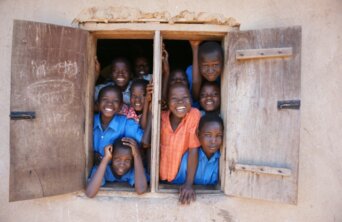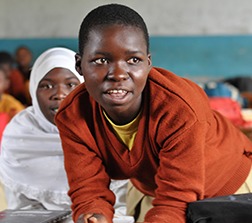- About
- Topics
- Picks
- Audio
- Story
- In-Depth
- Opinion
- News
- Donate
- Signup for our newsletterOur Editors' Best Picks.Send
Read, Debate: Engage.
| topic: | Child rights |
|---|---|
| located: | Nigeria, South Africa |
| editor: | Bob Koigi |
Children hold the key to the world's future, its inclusive development and growth. Yet, the future is uncertain for the over 2.2 billion children on earth, who have had to contend with many challenges from ongoing conflicts, endemic hunger, disease, poverty and climate change. In the wake of such devastating shocks, children's rights have often fallen by the wayside.
Children in conflict-affected regions, displaced and migrant ones, those living in rural areas and urban slums, and those with disabilities or affected by HIV/AIDS are particularly vulnerable.
Response and action towards protecting Children's fundamental rights and wellness have been slow and patchy. The result is a vulnerable generation living in fear.
In Africa, children below 18 make up nearly half of the continent's 1.2 billion-strong population and will reach 1 billion by 2055. Despite this, children are increasingly exposed to threats of epidemic proportions and are often not the subject of political discourse or the allocation of public resources.
For example, up to 42 million children of primary and secondary school age in the continent are not enrolled in school due to factors such as poverty. Lack of education denies them a bright future, dignity, and fundamental rights and exposes them to human rights abuses like early marriages and child labour.
Some countries have demonstrated that with the right policies, priorities and political will, child poverty can be turned into prosperity.
South Africa's Child Support Grant provides income security to households of vulnerable children with a $28 per child monthly stipend, reaching close to two-thirds of children below 18 years old. The grant has increased school enrollment and attendance, improved health status, early childhood development and caregiver access to the labour market.
Nigeria's Child Development Grant Programme, a social protection initiative targeting pregnant women and their children, allows cash transfers of up to $20 per month and counselling on nutrition, has tackled malnutrition and child hunger, boosted household food security and increased the number of children attending school.
Nigeria and South Africa's support initiatives for children have won them features in the Kids Rights Index, an annual review of government commitments to tackling child poverty.
As the world commemorates World Children's Day this year, the onus is on governments to step up to the commitment they made when they ratified various instruments to protect the rights of children, such as the Convention on the Rights of the Child (CRC) and the African Charter on the Rights and Welfare of the Child (ACRWC) while aligning national laws with international commitments.
The government is responsible for protecting children's rights and their futures, and any failure to do so will have devastating consequences for both children and the world.
Image by bill Wegener.

